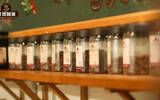Why is deep-roasted coffee still sour? When is coffee season? What are the definitions of bean raising period and taste appreciation period?
When we first enter the field of coffee, we will receive a lot of brand-new knowledge that we have never known before. Because they are not familiar with it, they can only be understood literally, and it is often easy to develop some wrong ideas and implement them. Over time, these misconceptions will mislead other knowledge taken later. So, Qianjie today, let's share some misunderstandings that are easy to step on when learning coffee.

The deeper the baking, the higher the caffeine content? There is a saying that many beginners can easily step into: "under the same parameters, deep-roasted coffee beans will extract more caffeine than light-roasted coffee beans!" After reading this sentence, many friends think that the deeper the baking, the higher the caffeine content.

But in fact, the content of caffeine does not increase with the deepening of roasting, because only the genes of the bean seed and the planting environment can affect the caffeine content (details can be moved to this article, "what are the factors that affect caffeine?" ") The reason why deep-roasted coffee will extract more caffeine is that the longer baking time greatly changes the structure of coffee beans and makes them easier to extract, so under the same parameters, deep-roasted coffee beans will brew more caffeine. So we can know that it's not that the deeper the coffee bean is roasted, the more caffeine it has, but the easier it is to extract caffeine.
Deep-roasted coffee is acid-free? "the lighter the roast, the more sour the coffee, and the deeper the roast, the more bitter the coffee." This is a sentence that everyone is very familiar with! Sour substances will continue to decompose with the advance of baking time, and eventually account for less and less taste in coffee. After a certain degree of baking, bitterness will dominate.
Then many friends will mistakenly think that coffee beans are acid-free when they are deeply roasted. But in fact, deep-roasted coffee still retains more sour substances, but under the cover of bitterness, it is difficult to be clearly felt. If you have drunk underextracted deep-roasted coffee or espresso, you can clearly feel the sour taste, because there are fewer bitter substances at this time, which cannot hide the sour substance.
Coffee roasting time as fresh as possible? After roasting, coffee beans will continue to volatilize carbon dioxide and flavor substances. Two months after baking, coffee beans stored at room temperature have lost almost all their aroma and flavor, and then brewed. You can only get a mediocre cup of coffee! So we will pursue the freshly baked coffee, so that the coffee beans are still fresh to make and enjoy.
Although, to pursue fresh coffee beans, but does not include beans that are too fresh. Because when the coffee beans are roasted, the beans will contain a lot of carbon dioxide! The presence of carbon dioxide will hinder the extraction of hot water, resulting in a deviation in the taste of brewed coffee, especially for the more sensitive way of extraction such as Italian, the impact is huge! In addition, the coffee produced will be accompanied by a very obvious "dryness". So we need to exhaust after a period of time, reduce the carbon dioxide that will make the extraction different, and remove the dryness. And this is what we often call the "bean cultivation period". When the bean cultivation period is over, the content of carbon dioxide is reduced to a range that does not affect the extraction, and then we will be better able to make delicious coffee. So we can know that beans should be fresh, but not too fresh. At the same time, there is another point to note that coffee beans do not mean that they cannot be extracted after baking, but are not recommended because the extraction parameters need to be adjusted and the fault tolerance rate is too low.
Coffee in the new season is the coffee harvested this year?
Not only baking, coffee harvest time is also very fastidious! Freshly harvested coffee beans always have the richest flavor substances, so when ordering, many coffee lovers always ask the store whether the beans belong to the new production season. But many beginners will mistakenly think that the new season refers to the fresh coffee beans harvested in the current season or that year, which is not quite right.
What we need to know is that most of the good coffee we can drink now needs to be imported from abroad. On the other hand, raw coffee beans can not be directly "cooked" and enjoyed by us as soon as they are harvested, because the harvested coffee fruits need to be picked and processed. Only by removing the impurities (peel, pulp, pectin) outside the coffee beans and reducing the moisture content to the specified range can the coffee beans have a longer storage time and show a full flavor only when they are roasted later.
And all this work takes time to deal with, which basically takes nearly a month. What's more, most coffee beans "can't afford to fly". After all, they can't afford air tickets at all, so they can only enter our country by ship, which takes the longest time and takes about 3 to 6 months. This is very unfriendly for coffee beans whose season is from October to January of the following year. Because according to the conventional concept of time, these beans will be harvested in October and will not be delivered to the bakers until April or May the following year. They are already coffee beans harvested last year. But according to the coffee season, these beans are now "full and juicy" new season coffee beans. Therefore, we can not apply the conventional concept of time to the freshness of coffee beans, which is very easy to produce cognitive errors.
-END-
Important Notice :
前街咖啡 FrontStreet Coffee has moved to new addredd:
FrontStreet Coffee Address: 315,Donghua East Road,GuangZhou
Tel:020 38364473
- Prev

Can deep-roasted espresso beans be made by hand? What is the difference between single coffee beans and mixed beans?
Although there are many ways to make coffee, for now, all coffee can be broadly divided into two categories: one is espresso with diverse ways to play, and the other is single-piece coffee that mainly displays flavor. Therefore, there are two main types of coffee beans currently sold on the market: Italian beans specially blended for espresso, and
- Next

Atlantic hurricane season is here! Coffee and other industries in many coffee-producing countries in Central America will be seriously affected
Recently, the National Oceanic and Atmospheric Administration (NOAA) released a report saying that the 2024 Atlantic hurricane season will become "extraordinary" and the upcoming 2024 hurricane season may face three times the usual risk. According to reports, at the peak of the hurricane season, which began June 1, warm and warm
Related
- What grade does Jamaica Blue Mountain No. 1 coffee belong to and how to drink it better? What is the highest grade of Blue Mountain coffee for coffee aristocrats?
- What are the flavor characteristics of the world-famous coffee Blue Mountain No. 1 Golden Mantelin? What are the characteristics of deep-roasted bitter coffee?
- Can I make coffee a second time in an Italian hand-brewed mocha pot? Why can't coffee be brewed several times like tea leaves?
- Hand-brewed coffee flows with a knife and a tornado. How to brew it? What is the proportion of grinding water and water temperature divided into?
- What is the difference between Indonesian Sumatra Mantinin coffee and gold Mantinin? How to distinguish between real and fake golden Mantelin coffee?
- What does bypass mean in coffee? Why can hand-brewed coffee and water make it better?
- Unexpected! Ruixing Telunsu lattes use a smoothie machine to foam milk?!
- % Arabia's first store in Henan opens into the village?! Netizen: Thought it was P's
- Does an authentic standard mocha coffee recipe use chocolate sauce or powder? Mocha Latte/Dirty Coffee/Salty Mocha Coffee Recipe Share!
- What is the difference between Vietnam egg coffee and Norway egg coffee? Hand-brewed single product coffee filter paper filter cloth filter flat solution!

